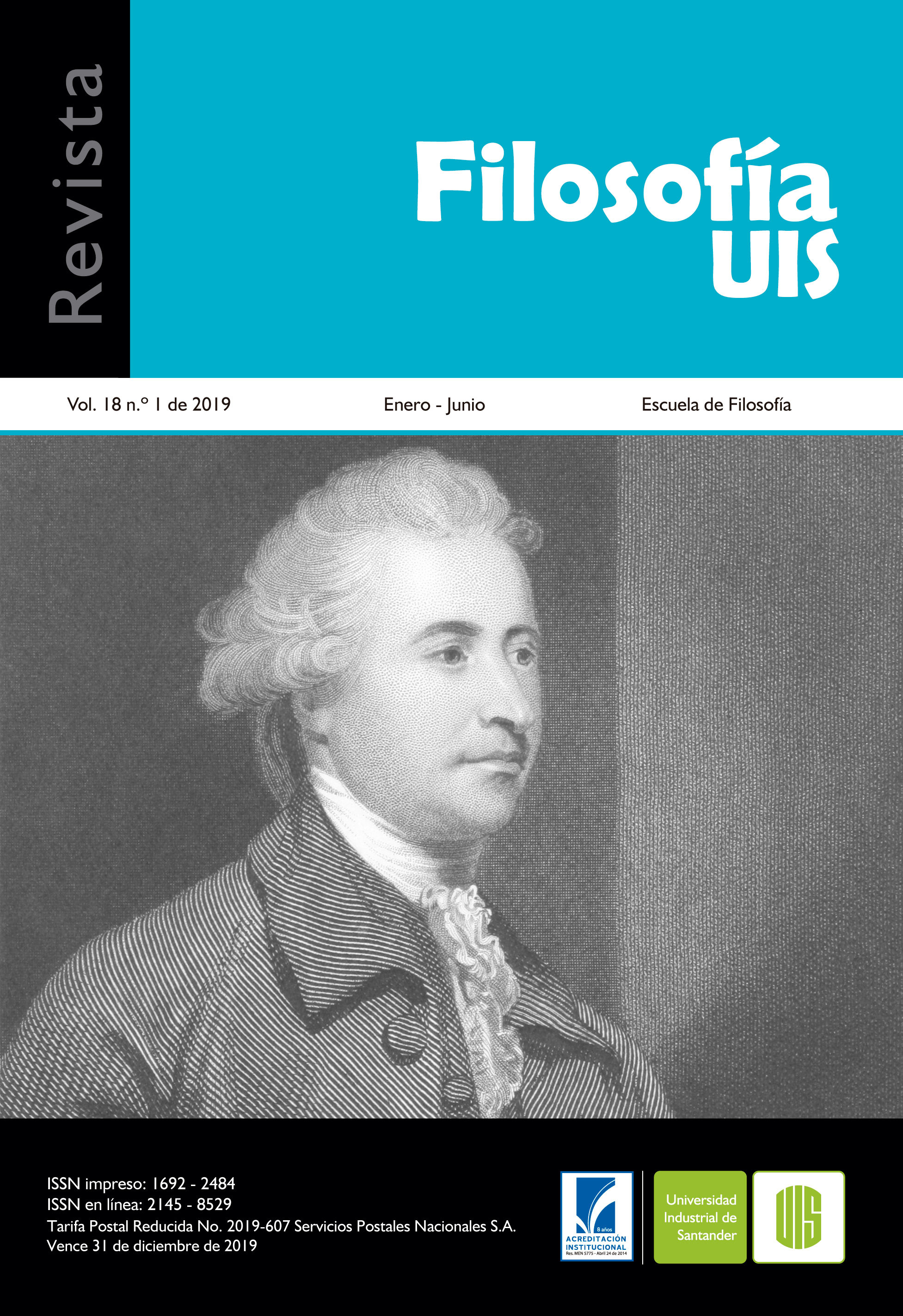Human dignity according to the debate Burke vs Paine found in the works Reflections on the revolution in France and Rights of man
Published 2019-01-01
Keywords
- human dignity,
- liberalism,
- conservatism,
- iusnaturalism,
- right
- value ...More
How to Cite
Copyright (c) 2019 Revista Filosofía UIS

This work is licensed under a Creative Commons Attribution 4.0 International License.
Abstract
The present investigation had his origin in the search of the roots of the current concept of human dignity. Hence the reader could see in this writing the result of the analysis on the above mentioned notion in one of the most important debates of the XVIIIth century, to knowing, which they supported, on the one hand, liberal and historicist Edmund Burke and, for other, liberal and individualistic Thomas Paine, who took as a base the circumstances that surrounded the French Revolution of 1789. In the course of the text there will be identified and confronted both proposals, specifically with regard to the dignity, so much that of the Briton, in the book Reflect on the Revolution in France of 1790, which is established in the defense of the tradition, the same one that bears a moderate and limited government where the rights are respected that the use and the custom they give man in society; as that of the American, found in Rights of the man of 1791, for whom the source of the rights and the freedoms is the proper nature of the man out of the society, reason for which, in this one only there is an exchange of the natural rights that in nothing can affect the use and the enjoyment of the same ones.
Downloads
References
Bariffi, F. (2003). Negación de los Derechos Humanos: El pensamiento conservador de Edmund Burke. Revista Telemática de Filosofía del Derecho, (6), 265-278.
Bascuñán, A. (1971). Manual de técnica de la investigación jurídica. Santiago de Chile: Jurídica de Chile.
Berlin, I. (1983). Contra la corriente. Ensayos sobre la historia de las ideas. Ciudad de México: Fondo de Cultura Económica.
Botero, A. (2008). La pluralidad de significados del conservatismo: ¿desde dónde hablamos? En E. Domínguez. (Comp.). Historia de las ideologías políticas (pp. 595-614). Medellín: Fondo Editorial Universidad EAFIT.
Botero, A. (2015). Fioravanti visita Colombia: Sobre la aplicación de los modelos de cartas de derechos constitucionales. Revista Filosofía UIS, 14(2), 15-47.
Burke, E. (2013). Reflexiones sobre la Revolución en Francia (C. Mellizo, Trad.). Madrid: Alianza Editorial.
Burke, E. (1790). Reflections on the Revolution in France. Ontario, Canadá: McMaster University. Recuperado de https://socialsciences.mcmaster.ca/econ/ugcm/3ll3/burke/revfrance.pdf.
Der Pfordten, D. (2009). On the Dignity of Man in Kant. The Royal Institute of Philosophy, 84. Recuperado de http://journals.cambridge.org.
Escolano, P. (2012). Presencia del pensamiento de Edmund Burke sobre el liberalismo doctrinario español, 1834-1854. APORTES, (79), 51-76.
Espejel, J. (2015). Liberalismo y conservadurismo en la formación disciplinaria de la Administración Pública. Cuadernos de Gobierno y Administración Pública, 2(2), 117-139.
Fioravanti, M. (1998). Los derechos fundamentales: apuntes de historia de las constituciones (M. Martínez, Trad.). Madrid: Trotta.
Fletcher, G.P. (1984). Human Dignity as a Constitutional Value. University of Western Ontario Law Review, 22.
García, M. (2017). Los Derechos Humanos desde la perspectiva de Thomas Paine (Tesis doctoral). Universidad de Extremadura, Badajoz, España.
García, J. (2016). La respuesta liberal de Edmund Burke a la crisis de legitimidad política del siglo XVIII (Tesis doctoral). Universidad Complutense, Madrid.
Habermas, J. (2010). El concepto de dignidad humana y la utopía realista de los derechos humanos. Diánoia, LV, 3-25.
Herrera, J. (1989). Los Derechos Humanos desde la Escuela de Budapest. Madrid: Tecnos.
Kant, I. (2007). Fundamentación de la metafísica de las costumbres (M. García, Trad.). San Juan, Puerto Rico: Edición de Pedro Rosario.
Marín, M. (2007). La dignidad humana, los Derechos Humanos y los Derechos Constitucionales. Revista de Bioética y Derecho, (9), 1-8.
Marina, J., et al. (2000). La lucha por la dignidad: Teoría de la felicidad política. Barcelona: Anagrama.
McCrudden, C. (2008). Human Dignity and Judicial Interpretation of Human Rights. The European Journal of International Law, 19(4), 655-724.
Moncho, J. (2003). Sobre la dignidad humana. Ágora: papeles de filosofía. 22(1), 189-202.
Paine, T. (2008). Derechos del hombre (F. Santos, Trad.). Madrid: Alianza Editorial.
Peces-barba, G., et al. (2001). Historia de los Derechos Fundamentales, siglos XVI-XX, Tomo II, Siglo XVIII. Madrid: Dykinson S.L.
Pico della Mirandola, G. (2010). Discurso sobre la dignidad del hombre (A. Ruíz, Trad.). Revista Digital Universitaria, 11(11), 1-6.
Pisarello, G. (2000). Vindicación de Thomas Paine. Revista Derecho del Estado, (8), 3-29.
Suñé, E. (1987). El iusnaturalismo político de Edmund Burke. Revista Persona y Derecho, (16), 205-351.
Waldron, J. (2009). Dignity, Rank, and Rights: The 2009 Tanner Lectures at UC Berkeley. NYU School of Law, Public Law Research Paper No. 09-50. Recuperado de http://ssrn.com/abstract=1461220.

